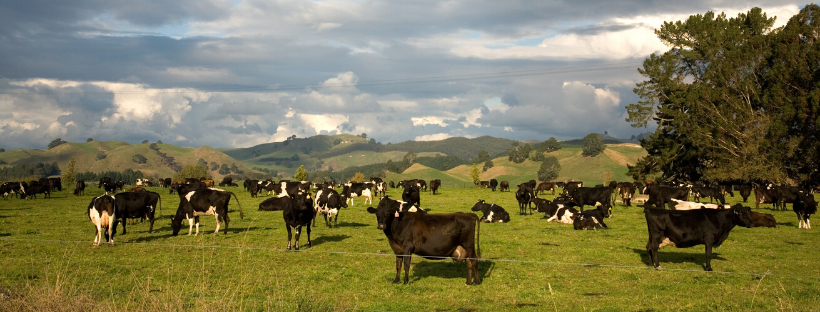12
Nov
Tell USDA to Stop “Organic” Factories from Milking Conventional Dairy Cows
 (Beyond Pesticides, November 12, 2019) Current USDA regulations clearly state that after a dairy farmer takes advantage of a one-time exemption to convert an existing “distinct” herd to organic production—all animals brought onto the farm must have been managed organically from the last third of gestation—in the case of cows, from three months prior to birth.
(Beyond Pesticides, November 12, 2019) Current USDA regulations clearly state that after a dairy farmer takes advantage of a one-time exemption to convert an existing “distinct” herd to organic production—all animals brought onto the farm must have been managed organically from the last third of gestation—in the case of cows, from three months prior to birth.
However, USDA has interpreted the prohibition to mean that dairies could purchase animals, on an ongoing basis, who were born and raised on conventional dairies. These calves receive medicated milk replacer (formula laced with antibiotics) and, after weaning, are fed conventional GMO crops generally sprayed with Bayer/Monsanto’s Roundup.®
Now, as livestock factories are taking over a good share of the organic market and pushing family-scale farmers off the land, USDA has finally, only after being forced by Congress, written additional regulatory language intending to close a loophole created by USDA’s negligence.
Organic farmers are mandated to provide healthy living conditions where livestock can exhibit their natural instinctive behaviors. When they do that—and for dairy cattle, that means grazing on fresh grass—the cows are not pushed for damaging high milk production and live long healthy lives.
With the USDA permitting converted conventional cattle, it became quicker and cheaper to start giant industrial-scale dairies, some managing 20,000-head each, competitively damaging ethical organic family farmers.
Even worse, these livestock factories are primarily confining cattle in giant buildings or feedlots, pushing them for unhealthy high production with “hot rations.” This results in demonstrably more milk produced per cow, but comes at a grave cost to the animals, who end up living short, stressful, and unhealthy lives. Since organic standards prohibit the use of antibiotics to treat related illnesses, many of these animals are sent to an early slaughter.
We will be formally sending your petition, along with those of others, before the December 2 deadline.
Petition Letter
Sign the Petition: Comments Due to the USDA December 2
Thank you for the opportunity to provide public input on the Proposed Rule on the Origin of Livestock. I fully support the effort to close the “loopholes” that have allowed the continued practice of bringing conventional livestock on to organic farms. USDA’s actions have violated the spirit and letter of the organic law, allowing factory farm livestock operations to manage their herds using practices that are not sustainable and do not promote the health of their livestock.
However, the proposed new rule appears to create a new loophole that must be closed to prevent the ongoing abuse of the intent and spirit of organic law.
Specifically, please adopt the following changes:
The rule must require that any organic dairy farm selling organic animals be a functioning “commercial dairy” that is inspected and permitted by the state in which it operates. Furthermore, this dairy farm must have a relationship with a licensed milk handler shipping to a licensed dairy plant. In addition, this operation should be fully established, shipping milk for no less than 180 days, and any animal sold should be producing milk herself. This means that no young transitioned heifers, who have never been milked, could qualify for sale as “organic.”
As an alternative, as proposed by the Northeast Organic Dairy Producers Alliance, should the National Organic Program seek a definitive solution to the potential loophole noted above, it could simply choose to ban, outright, the sale to an organic operation of any cattle that had been transitioned from conventional production to organic production.
The final rule should close the loophole for breeding stock by creating additional safeguards that would prevent rotating animals in and out of organic production and only allow periodic and limited editions for genetic diversity (prohibiting the practice of converting first litter sows to organic production on a continual basis).
Thank you for considering my comments on this important matter.
And finally, because of the long-term nature of this controversy there should be no phase-in to the new rule restrictions. Any conventional cattle that are in the process of being transitioned to organic should be allowed, regardless of the fact that it is considered by many to be illegitimate under the current regulations, to complete the process.
Allowing for a phase-in will cause a rush of conventional cattle to start the transition process to organic. This could cause a further exacerbation of the current glut of organic milk, crashing the price and shifting even more market share to the giant, industrial scale producers — driving additional farmers out of business.
Sincerely,
The undersigned











The “organic” label should not be allowed for dairy cattle raised on conventional, “factory” farms. These factory-farm raised cows received medicated milk replacer (formula laced with antibiotics) and, after weaning, were fed conventional GMO crops generally sprayed with Bayer/Monsanto’s Roundup.®
To be certified as “organic” dairy cattle need to have been raised organic for their entire lives.
November 12th, 2019 at 4:56 pmI PRAY TO GOD TO PLEASE BLESS AND PROTECT HIS MOST INNOCENTS,HIS ANIMALS! I PRAY ONE DAY SOON,ALL ANIMALS WILL HAVE A CHOICE AND THE ONLY CHOICE IS TO LIVE,A HAPPY,PAIN FREE LIFE!
November 13th, 2019 at 8:59 amI hereby am signing this petition urging the U.S.D.A. to change its “loophole” language that allows conventionally-raised dairy calves to drink an antibiotic-laced formula and, after weaning, be fed conventional GMO crops sprayed with glyophosate (i.e., Roundup, which is a toxic herbicide made by Monsanto, Inc.).
November 21st, 2019 at 3:48 pm